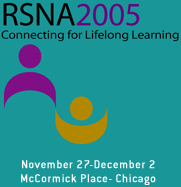
Abstract Archives of the RSNA, 2005
Funda Gul Koseoglu MBBCH, Presenter: Nothing to Disclose
Melahat Garipagaoglu MD, Abstract Co-Author: Nothing to Disclose
Ebru Yurdakonar MD, Abstract Co-Author: Nothing to Disclose
Nina Tuncel PhD, Abstract Co-Author: Nothing to Disclose
Omer Kucuk MD, Abstract Co-Author: Nothing to Disclose
Purpose/Objective: Decreasing the toxicity of radiotherapy (RT) without reducing its efficacy remains a major challenge in the treatment of cancer patients. This study aimed to evaluate whether lycopene (L) could reduce acute gastrointestinal side effects in Wistar albino rats. Materials/Methods: 70 female, 2.5-3 month-old, Wistar albino rats were used. The rats were divided into 4 groups of at least 15 rats per group (Group 1: Control [C], Group 2: L only, Group 3: RT only, Group 4: L plus RT [LRT]). 5-mg/kg/day L was given for 10 days with gastric tube. Abdominopelvic irradiation was performed under sedation on day 10 using 8 Gy single fraction RT dose with 150 kV energy. Clinical and biochemical endpoints included diarrhea, duration of diarrhea, weight loss, survival, plasma thiobarbituric acid reactive substance (TBARSp). The stools of all rats were inspected daily to detect the presence of diarrhea for 30 days. All rats were weighed on days 0, 10, 14, 17, 20, 23, 27 and 30. Deaths for any reason were recorded. TBARSp were determined on blood samples taken from the tails of the rats under ether sedation, on day 10 in Group 1, days 10, 14, and 16 in Group 3 and days 0, 10, 14, and 16 in Groups 2 and 4. Results: Significant weight gain between days 1 and 30 was observed in the C and the L only groups and weight gain ratios were significantly higher in the L only group (p= 0.021). Rats in the RT only and the LRT groups gained weight between days 1 and 10, but the rats receiving RT only lost weight rapidly during days 10 to 14 and maintained weight between days 14 and 17, whereas LRT group showed continuous and moderate weight loss pattern between days 10 and 17. After day 17 both groups started to gain weight until day 30. Although the RT only and the LRT groups lost significant weight between days 10 and 14, weight loss rates were significantly higher in the RT only group (p= 0.001). However, weight gain ratios during the days 17-30 were similar. None of the rats in the C and the L only groups experienced diarrhea but rats given RT on the day 10 developed diarrhea on day 12 which lasted 0,5 -1,5 days. Diarrhea ratio was 8/11 (72.7%) in the RT only group and 7/15 (46.7%) in LRT group, (p= 0.246). No significant differences were seen between the RT only and the L RT groups in neither the diarrhea ratio and nor the mean diarrhea period. No mortality was seen due to irradiation side effects but 5 rats died due to respiratory arrest secondary to heavy sedation. TBARSp levels decreased significantly in the L only group (p=0.03), while there was a significant increase in the RT only group (p=0.003) between days 10 and 14. After day 14 TBARSp levels started to decrease and it was significantly higher on day 16 compared to the baseline level (p= 0.008) in the RT only group. In the LRT group there was an increase between days 10 and 14 but it was not significant, while a significant decrease was observed between days 14 and 16 (p=0.005). Furthermore, there was a significant correlation between the TBARSp levels and the weight loss ratio between days 10 and 14, in the RT only group (r= -0.709, p= 0.01). TBARSp levels were significantly lower in the L only group compared to the LRT group, both on days 14 (p= 0.041) and 16 (p= 0.027). The levels were significantly less in LRT group compared to the RT only group, both on days 14 (p= 0.001) and 16 (p= 0.001). Conclusions: Lycopene significantly reduced the weight loss that might be related to a combination of anorexia, emesis and diarrhea; furthermore it prevented the oxidative stress increase seen after abdominopelvic irradiation in Wistar rats.
Koseoglu, F,
Garipagaoglu, M,
Yurdakonar, E,
Tuncel, N,
Kucuk, O,
Efficacy of Lycopene in Reducing Radiation-induced Gastrointestinal Side Effects. Radiological Society of North America 2005 Scientific Assembly and Annual Meeting, November 27 - December 2, 2005 ,Chicago IL.
http://archive.rsna.org/2005/4420633.html

